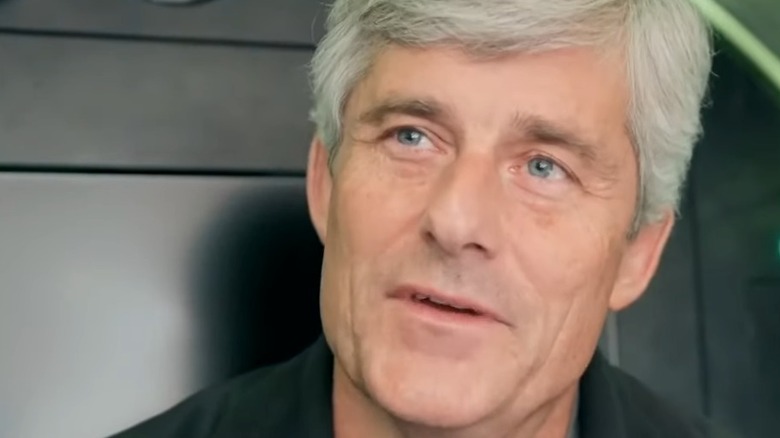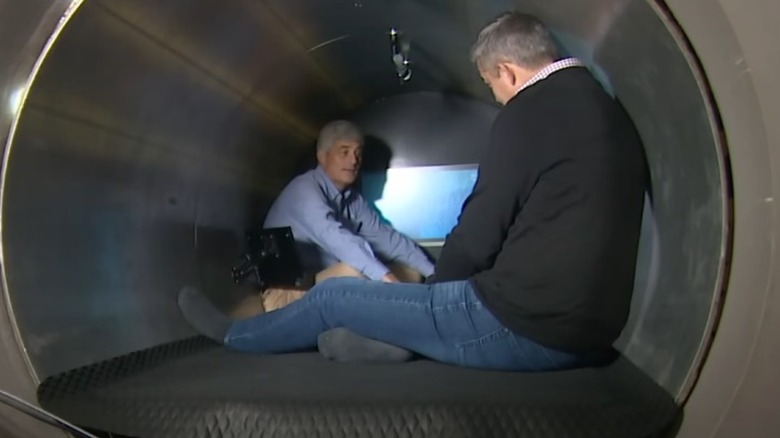How Much Training OceanGate CEO Stockton Rush Had Before The Titanic Sub Disappeared
On June 18, 2023, the terrible news broke that a submersible passenger vessel had gone missing more than 400 miles south of St John's, Newfoundland, in the Atlantic Ocean. The American-built craft, known as the Titan, was carrying five passengers: British businessmen Hamish Harding, Shahzada Dawood and his 19-year-old son Suleman, French explorer Paul-Henri Nargeolet, and Stockton Rush, the CEO of OceanGate Expeditions — the company responsible for the journey.
Other than Rush, they were all commercial passengers, and each paid a reported $250,000 to venture to the seabed and explore the wreck of the Titanic, the cruise ship that struck an iceberg and sank in the same waters on its maiden voyage in 1912, killing an estimated 1,500 people on board. In the days that followed, a collaborative search and rescue effort from the U.S., the U.K., Canada, and France made headline news as rescuers raced against time to bring the craft to the surface before the passengers ran out of air.
Meanwhile, news outlets sought to uncover what might have gone wrong on board the submersible that lead to such a catastrophic emergency and delved into the history of Rush and his company, OceanGate. Rush was a distinguished handler of various forms of transport, whose company had been in operation for many years. There were also, however, a few notable controversies surrounding OceanGate's safety procedures.
On June 22, 2023, the Coast Guard announced in a press conference that the Titan likely imploded, killing all aboard. Rush was 61 when he died (via CNN).
Stockton Rush's impressive resume
Look at just some of the notable achievements throughout his career, and it's no surprise the late OceanGate CEO Stockton Rush was a well-regarded submarine captain with a business that involved taking wealthy, paying customers to explore the Titanic wreck. Rush first rose to prominence in 1981 as a teenager. At the age of 19, he received a DC-8 Type/captain's rating at the United Airlines Jet Training Institute, making him the world's youngest jet transport-rated pilot of the day.
From a wealthy oil family, Rush graduated from New Hampshire's Phillips Exeter Academy and earned a Bachelor of Science degree in aerospace engineering from Princeton University. Afterward, he earned a Master of Business Administration from the University of California, Berkeley, The New York Times reports. While in college, Rush spent his vacations as a sub-contractor for Saudi Arabian Airlines, flying passengers to Europe, Africa, and the Middle East.
Since then, Rush was involved in various companies, some of which were focused on marine technology, such as radar. More saliently, Rush built his own aircraft and submarine, the latter of which he dove with more than 30 times. He once dreamed of becoming an Air Force pilot but was ineligible for training due to poor eyesight. In 2022, Rush told "CBS Sunday Morning" (via The Times), "I think I can do this just as safely by breaking the rules," referring to his company and deep sea tourism.
A specialist in submersibles
Stockton Rush founded OceanGate Inc. in 2009, which according to the company's website is "an ocean exploration venture focused on providing crewed submersible services to enable researchers and explorers to access the oceans' vast resources." The company has operated three submersibles since then, including the Titan, an innovative craft built from modern, lightweight materials to reduce operating costs. The website claims that OceanGate has undertaken over 14 expeditions and more than 200 dives in total. The company does not specify how many of those were captained by Rush.
But the history of OceanGate to this point isn't entirely unblemished. As reported by several news outlets, there was some controversy at the company concerning a 2018 complaint to the Occupational Safety and Health Administration filed by the company's director of marine operations, David Lochridge, who was fired after raising doubts about the safety of the Titan. A court filing by Lochridge's lawyers warned that "paying passengers would not be aware, and would not be informed" of the Titan's "experimental design."
The concerns were raised the same year the vessel suffered a "catastrophic implosion," based on Coast Guard findings (per CBS News). Lochridge's position was supported by a number of experts in the industry, including the Marine Technology Society's committee on manned submersibles (MTS). Lochridge and others warned Rush of Titan's safety shortcomings. OceanGate sued Lochridge for breach of contract.
As MTS chairman Will Kohnen told Guardian News in 2018 (via YouTube), the Titan was an "outlier" because it was one of 10 submersibles that could go to ocean depths of 4,000 meters — but was uncertified, with "no oversight during design, fabrication, and testing."


